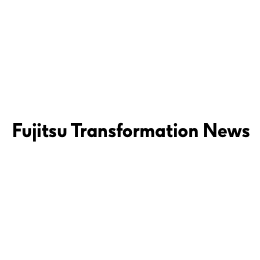- Contents
How will we make the future?
We at Fujitsu believe that the answer to this question should be considered together with those who are responsible for the future.
We conduct Future Talk Sessions where we think and share dialogs with the next generation about the challenges we are facing, as well as prospects and initiatives for the future.
This time, we will present a wide-ranging dialog with students from the Faculty of Global Liberal Arts at Kanda University of International Studies who study SDGs and social issues. The theme is “What is well-being for me?”.
(This article is a summary of the special presentation Future Talk Session in CEATEC presented as part of CEATEC 2021 ONLINE, which was held from October 19 – 22, 2021.)

Participants from left
- Toshiaki Ariyama, Director at Fujitsu, Head of the Social Design Business Unit
- Masaaki Ishii, Professor in the Faculty of Global Liberal Arts, Director and Assistant Professor at the Center for Learning and Teaching Innovation, Kanda University of International Studies
- Futaba Watanabe, Faculty of Global Liberal Arts, Kanda University of International Studies
- Wataru Nagato, Faculty of Global Liberal Arts, Kanda University of International Studies
- Sora Tanabe, Faculty of Global Liberal Arts, Kanda University of International Studies
Expectations and Anxieties About the Future
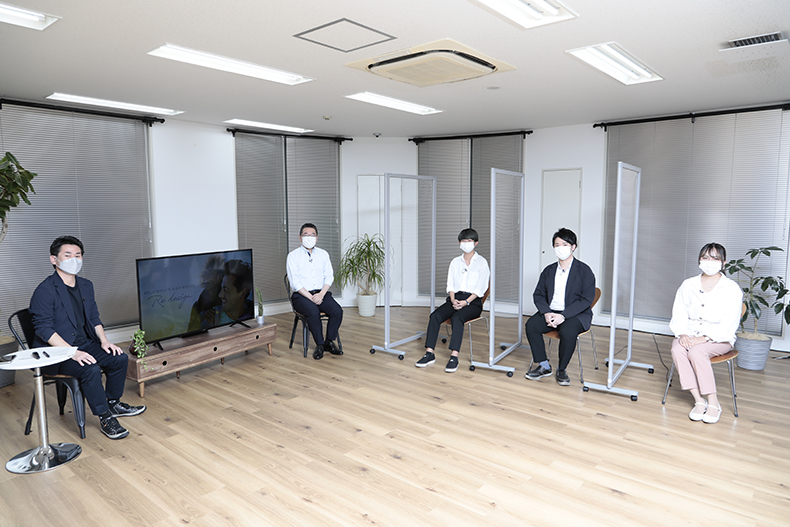
Toshiaki Ariyama: I’d like to start by asking each of you to introduce yourself and tell us what you are interested in.
Futaba Watanabe: My name is Futaba Watanabe. I have long been uncomfortable with the fact that uniforms are clearly differentiated for men and women. When I was in high school, I wore slacks rather than a skirt. Wouldn’ t it be a better world if everyone could express themselves by wearing the clothes they want to wear? I thought about this issue, and as a result, I became interested in gender and gender-neutral clothing. In addition to gender-neutral clothing, I am also interested in sustainable clothing. However, sustainable products are expensive, so there is the challenge that it is difficult for young people to afford them. I believe that if there is a system where people are not restricted from engaging in sustainable activities, it will lead to the realization of a better society.
Wataru Nagato: My name is Wataru Nagato and I’m a first-year student. I would like to carry out research in relation to AI and meteorological disasters. In 2019, Chiba Prefecture, where I live, experienced natural disasters such as typhoons and heavy rains. After this experience, I began to wonder if this damage could have been predicted, and that is how I became interested in research on using AI to prepare for unforeseen events. I believe that this research can be applied not only in predicting natural disasters, but also in aiding recovery in the case that such an event occurs.
Toshiaki Ariyama: Disaster prevention issues are linked to global environmental issues, and I feel that this is an area that should be addressed using technology. The Japan Meteorological Agency uses a supercomputer for forecasting. Fujitsu is providing support for some parts of the system and both simulation-based and empirical predictions are required.
Sora Tanabe: My name is Sora Tanabe. I am interested in international peace and refugee issues. When I was in the first year of high school, I was shocked to learn that half of the world’s refugees are the same age as me. There are lot of people who don't have a place to sleep, bathe and eat food each day, which are things that we often take for granted. I think that there is nothing scarier than taking peace for granted. Keeping in mind that the value of peace differs for each and every person, I am in the process of exploring what I can do to help realize international peace.
Toshiaki Ariyama: We can see what's happening around the world now, and it's important to take action after finding out the situation. Fujitsu established our Purpose as "to make the world more sustainable by building trust in society through innovation." Instead of spending the company's money on solving SDGs, we are working to solve social problems as a sustainable business and generate revenue in this way. We are now at a major inflection point of our time. I think dialogs like today’s are important for making us stop and think about how to shape a new world rather simply sitting around waiting for change to come. I look forward to the rest of our talk session.
Changes in Relationships and Belonging
Toshiaki Ariyama: Our new normal society hybridizes online and offline situations. What do you think about relationships and belonging in this context?
Futaba Watanabe: The combination of online and offline has allowed us many more opportunities to connect with people. During the stay-at-home period, by participating in a range of online events and by organizing those myself, I was able to expand my network by connecting with people from all around the world. It’s like having my own place in the world, outside of just having that at home or at school.
Sora Tanabe: By going online, we can interact with people around the world and feel familiar with the cultures and values of other countries. I think that dialog is a step toward realizing peace, but at the same time, I am concerned that if we only connect with people who think like us, we will create stereotypes. I think that we need to take the best of both online and offline, don’t you?
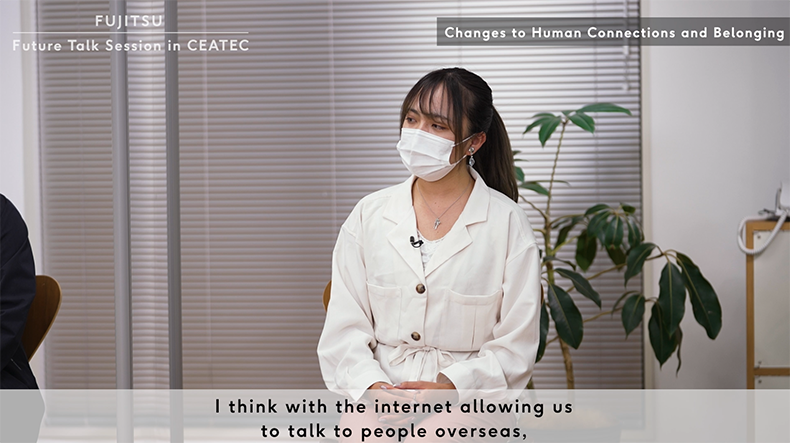
Toshiaki Ariyama: As someone in the field of technology, I think that there are still gaps in online technology. Although language information and visual information such as facial expressions can be expressed online, in our offline interactions we can actually sense information that cannot be verbalized. Online technology is still in a transitional stage and there is still plenty of room for further development.
What is a “Fulfilling”Way of Life?
Toshiaki Ariyama: As today’s theme is well-being, I was wondering if you could share your thoughts on how to live a fulfilling life, or situations that make you feel fulfilled.
Futaba Watanabe: I believe that a fulfilling way to live is to make the most of one's individuality and one's own personality, and to show those to the people around you. Nowadays, we sometimes encounter situations that limit the individuality of each person. However, it is important to make the most of our individuality in order to promote diverse ways of living. I would like to live a fulfilling life with my full personality.
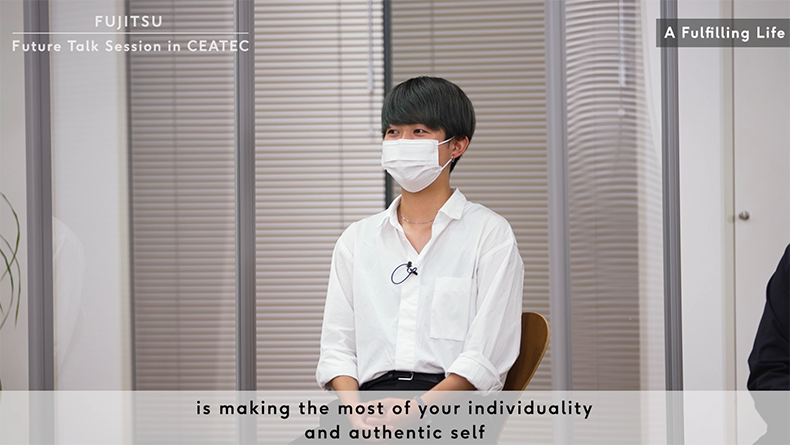
Toshiaki Ariyama: I love it. I fully support you! Are there any challenges to living in a diverse way?
Futaba Watanabe: Yes, there are. I think it would be good if there were genders other than male and female. For example, when there are toilets at the train station for men, women, and people with disabilities, I feel that I am categorized as a woman. I think it would be nice to see more open spaces that do not categorize the way we live in different situations.
Wataru Nagato: I think that being able to take joy in ordinary things is a kind of “fulfillment.” It is only when there is room in one’s heart that the emotion of joy can grow. I believe that fulfillment is hidden in the simple things in our daily lives.
Sora Tanabe: When I talk to friends who live abroad on the phone, I am glad to hear that they like certain things about Japan. At the same time, I want to know more about the country where the other person lives. Learning about each other's culture is good for the world, and it is a moment when I feel a small sense of happiness and fulfillment.
Toshiaki Ariyama: I think that we all have our own idea of what it means to be fulfilled, and these can vary widely. In order to be fulfilled, it is necessary to be healthy both physically and mentally. Is there any ideal that you would like to see in society or anything that you would like to see remain the same in order for people to maintain a healthy body and mind?
Futaba Watanabe: When I was in high school, I studied hard for the university entrance exam. However, as I continued to study, I became troubled because I couldn’t see the significance of studying, and I suffered from burnout right before the exam. There were times when I just couldn't study and couldn't even accept any food. If I had had a place where I could meet and talk with people who had gone through similar experiences, I think I would have felt more relaxed. In addition to family members, school teachers, or mental care professionals, I believe that many people could be helped by the existence of a community or system where they can confide their thoughts and feelings to someone who doesn't know them at all yet is able to receive their feelings directly from their heart.
Sora Tanabe: Well-being is something that is influenced by the relationships around us, and that changes over time. We live in a world where we can interact with a wide range of people online, but I think it will be important to have opportunities for face-to-face interaction in the post-Covid era.
Toshiaki Ariyama: Fujitsu has developed a business brand Fujitsu Uvance aimed at realizing a sustainable society. Within this brand, we are considering new businesses under the theme of Healthy Living as we move toward 2030. For example, if sharing and providing information about one's diseases and problems can help others with the same problems, we are now in an age where it is technologically possible to share and exchange data about each person in a secure system. After listening to each of you, I realized that it would be good to make the world a better place by providing such technology.
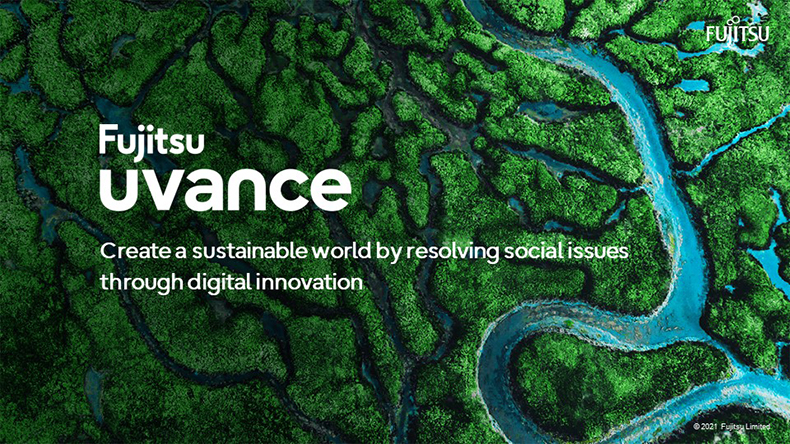
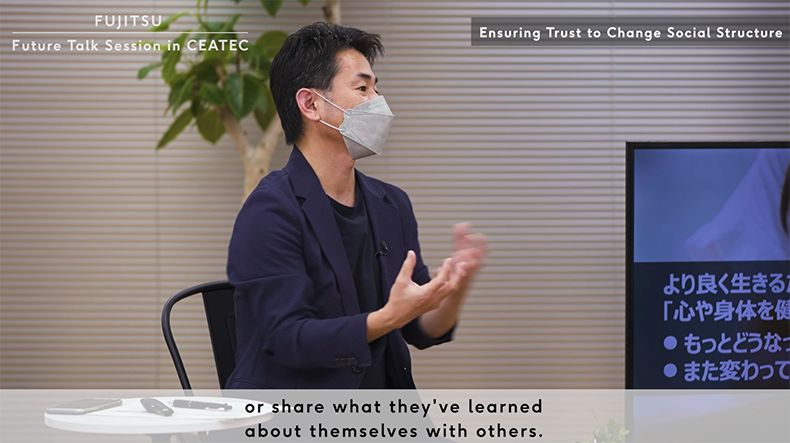
What is Needed for a Better World?
Toshiaki Ariyama: The last question is, if there is something you want, what do you need to do to achieve it? What do you think the world should you be like?
Wataru Nagato: There are still two sides to the AI debate. Conflicts arise because the definitions of the necessity of AI itself differ fundamentally from one position to the next. However, if we can promote research through friendly rivalry, rather than denying each other, we will be able to achieve better results. I have been interested in AI since I was in junior high school and high school, and I have been fortunate enough to get the opportunity to interact with and experience it. I feel that it was an extremely valuable experience, and I hope that companies will continue to provide opportunities for young people to come into contact with AI.
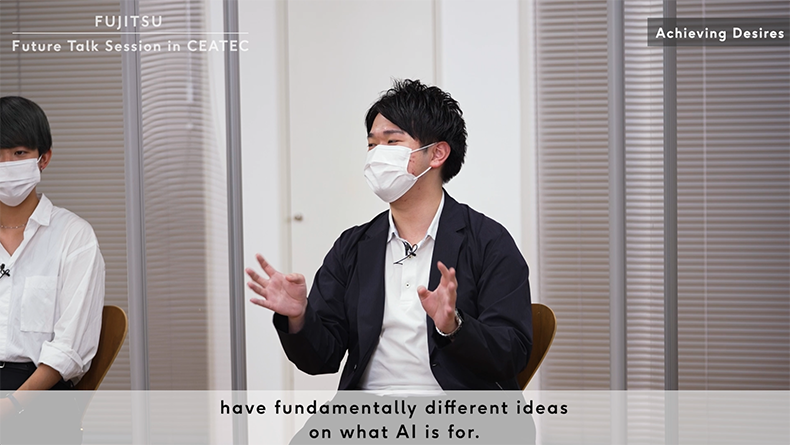
Toshiaki Ariyama: It is important to think about what AI is accepted by society and to make the final product with this in mind. I realized once again the importance of explaining to the world what AI is all about.
Futaba Watanabe: I think it will be necessary to build a relationship in which society’s demands for AI are directly transmitted to the supply side. For example, mass production and mass consumption of clothing is becoming a problem, but if consumers start to look at quality rather than quantity, the supply side will inevitably change. For this to happen, we need to change our mindset. This is an issue that we need to tackle together, not only with the younger generation, but also with each and every person who is driving the Japanese economy.
Toshiaki Ariyama: I am thinking about how we can change our logistics and supply chains right now. The consumer culture of producing and consuming more and more is changing dramatically. Fujitsu has a technology called Rice Exchange that can trace the flow from rice producers to the dining table. In other words, technology that can adjust the balance of demand, as Futaba just talked about, is now beginning to be implemented in society. Another example is that 60% of the trucks traveling on the Tomei Expressway are loaded with goods on the way to their destination, but they don't have any load on their way back. If, for example, drivers could trace information on the items they can carry, and connect with people who want truck transportation, the logistics industry could be revolutionized. Such a world can be created. We want to use technology to build trust with society. In order to promote this, I want young people to be more aware of their problems.
Masaaki Ishii: Today, consumers can communicate in many different ways. There is a strong affinity between technology and creating new relationships. I have high hopes for the future.
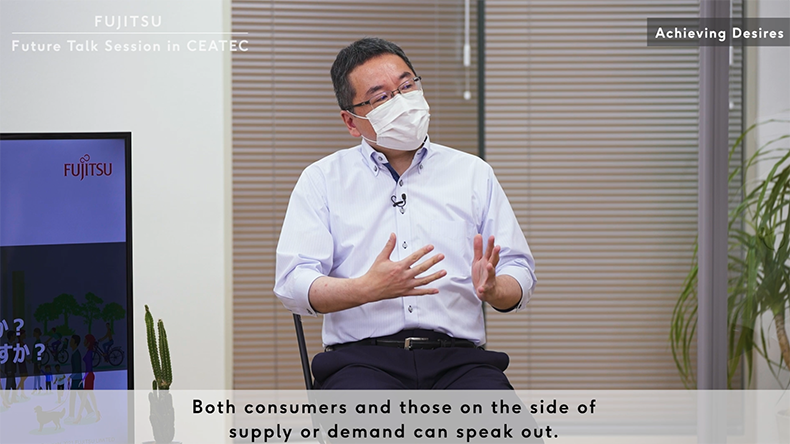
Toshiaki Ariyama: I think companies have an obligation to communicate how technology is being used. At Fujitsu, we have produced a technology experience called Explainable AI Technology, which visualizes the data that AI learns and the ethics of the AI.
What Have You Learned Through this Discussion?
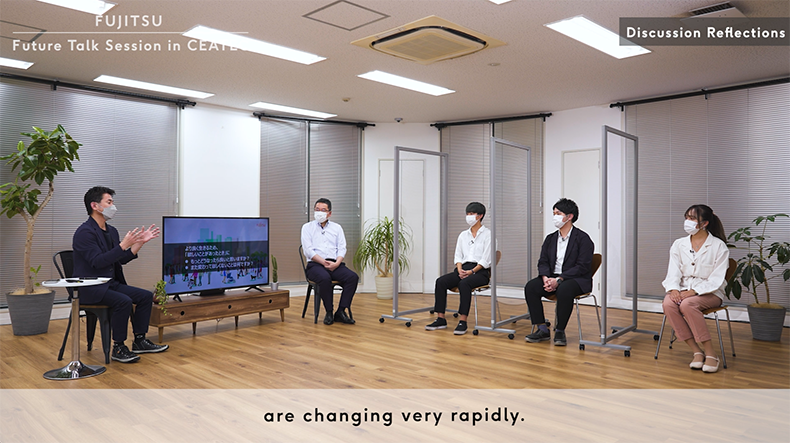
Toshiaki Ariyama: Finally, what did you notice and feel during this discussion?
Futaba Watanabe: I felt that it was very meaningful just telling the people around me what I was thinking. I would also like to express my gratitude to the adults who listen to me seriously. From now on, regardless of my age, I am determined to do everything I can, even if it means making mistakes.
Wataru Nagato: It is also important to hear the ideas of a range of people. This has given me new ideas and motivation. It was a very enjoyable and productive time.
Sora Tanabe: I hope that I can not only tell people what to do, but also take action myself. Even if it is only something small, I would like to do what I can, little by little.
Masaaki Ishii: In our increasingly complex world, no adult has “the answer.” Rather, it is important for both young people and adults to continue learning from the same standpoint. I keenly felt the importance of working together to realize a sustainable world through friendly competition and the exchange of opinions.
Toshiaki Ariyama: Through this dialog, I am convinced that the idea of doing business within the theme of solving social issues is the right path. I also feel that we have a mission to properly communicate how technology can be used and how it can be useful in the world. Individuals, corporations, and public-interest organizations... the relationships in society are changing. Fujitsu would like to take the ideals that each individual envisions for the future and redesign society in this way. Thank you for your time today. I look forward to your future messages and actions.
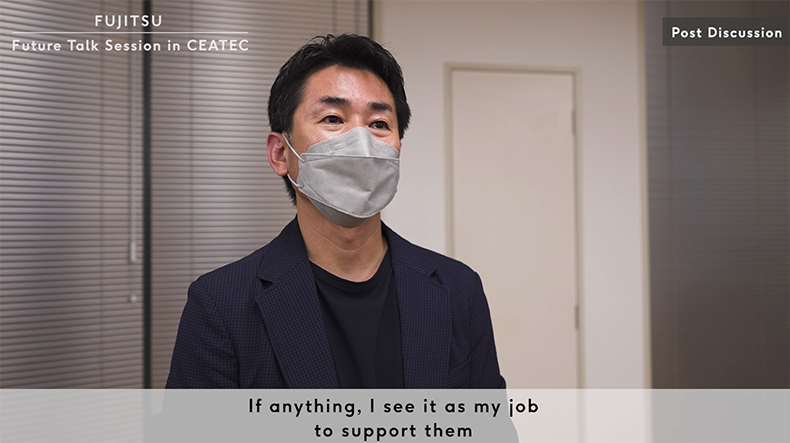
Movie
Full version (36:33)


